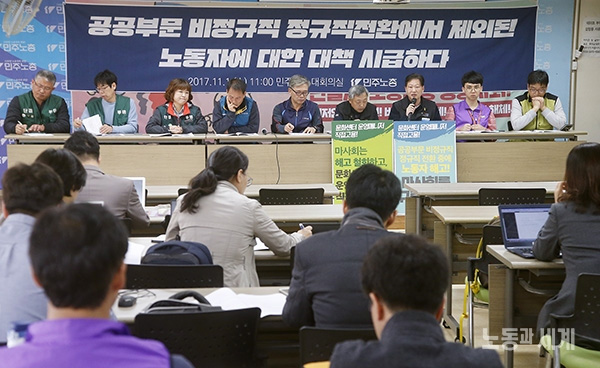
Questions are being raised regarding the outcome of a special survey on the situation of the conversion target groups for the job regularization, which was used to scale down to 205,000 out of the total number of irregular employees working at 853 bodies and organizations of the central government, local governments, public institutions, local public corporations, state and public educational institutions. As each institution defined the permanent and continuing jobs differently at its discretion, many irregular employees did not know whether they are belonging to the conversion target groups and cases were found that the special survey did not include those workers.
Take agency and subcontract workers for instance. the survey was conducted in the tasks of facility cleaning service, security, maintenance, data-processing and counselling. However, jobs in life waste collection and transportation, waste recycling, septic tank cleaning and trash incineration were excluded from the survey. It is criticized that the government seems to be obsessed with the performance accumulation of irregular job conversion in the public sector, while facing away the noticed loopholes. The labor circle called on the government to make public the survey document of each institution, containing the definition of intermittent work, conversion target group and excluded group.
The Korean Confederation of Trade Unions(KCTU) held a press briefing on November 1 at its head office and voiced up "the urgent measures for the irregular workers who are excluded from the regular job conversion target groups in the public sector".
In recent, the Ministry of Employment and Labor(MOEL) made public the outcome of a special survey on the situation of 853 public institutions and explained that it excludes 141,000 workers out of 316,000 irregular workers, who are defined to be difficult to convert their irregular positions due to rational reasons, such as contract teachers and instructors, senior workers aged over 60, specialists such as lawyers and medical doctors, workers in the restructuring industry such as the sunset industry and athletes.
KCTU introduced the tasks excluded by the conversion guideline which need the re-examination and cases which are not covered by the survey at all.
The National Human Rights Commission included the fixed-term workers who do the coordinating works in the area of discrimination prevention of the handicapped persons and the activities for children and youth as the irregular job conversion target group, recognizing the expanding nature of the work and the permanent and continuing nature of work. However, the Ministry of Strategy and Finance did not allocate any budget for the irregular job conversion, citing "the guideline exclusion reasons".
The Korea Gas Technology Corporation(Kogas-tech) excluded 11 design engineers from the job regularization, citing the project-oriented, highly professional and intermittent nature of work. An official of the Korean Public Service and Transport Workers' Union(KPTU) refuted that "the designing jobs of the Kogas-tech fall under the purview of the project in repetition and are not highly professional either" and demanded "the re-examination". The National Research Council for Economics, Humanities and Social Sciences(NRC) categorized 1,095 out of 2,048 fixed-term contract researchers as those working in 'temporary and intermittent jobs' without the required process through the 'Conversion Deliberation Committee'. NRC decided to shift only 695 irregular workers to the regular positions.
The Korea Coal Corporation excluded 1,109 subcontract workers from the job regularization target group, citing the changes of industrial demand for coals.
Job counsellors for senior workers of the Mokpo City local government and tuberculosis control program workers of a county office in Gangwon Province were excluded from the job regularization, since they were left out in the survey process, despite of their permanent and continuing nature of works.
KCTU Vice-President Kim Jong-in criticized that "there is no measures to take care of those irregular workers excluded from the job regularization," and "even though the government announced the 'era of zero irregular workers in the public sector', it turns out to be a kind of hope-torturing." FKTU Education Executive Director Kang Hoon-jung said that "the government should meticulously manage the job conversion policy to avoid any loopholes," and "the government should make public the composition of the job conversion deliberation committee and guarantee the participation of stakeholders including trade unions so that the effect of government policy can reach out to the workplaces."
reported by Bae Hye-jung
translated by Kim Sung-jin

